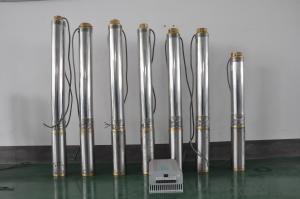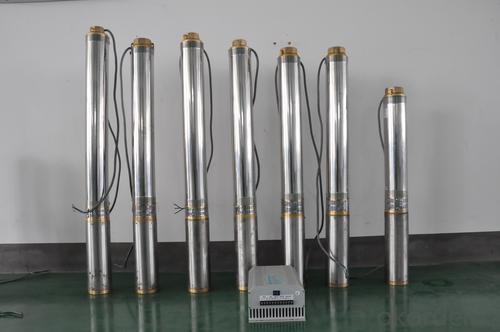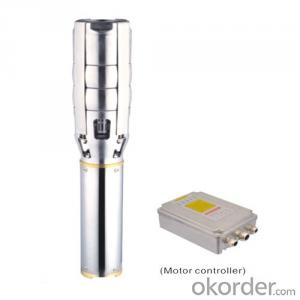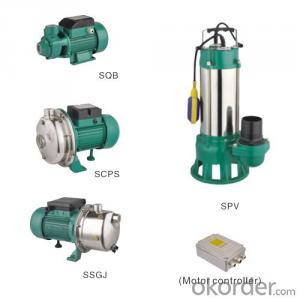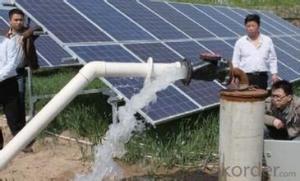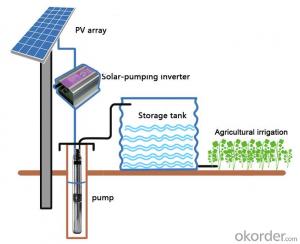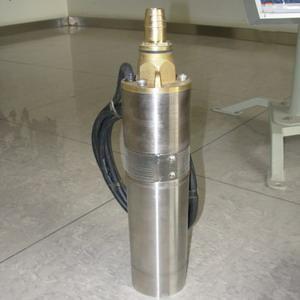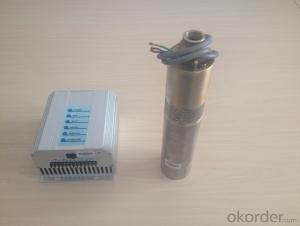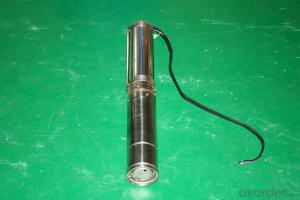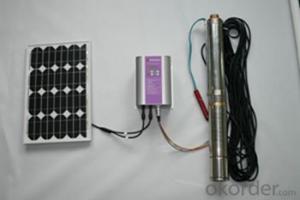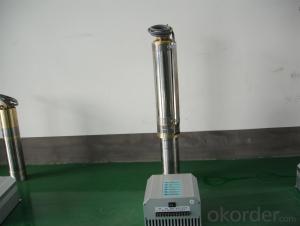Solar Pump Kit - Submersible Solar Water Pump
- Loading Port:
- China Main Port
- Payment Terms:
- TT OR LC
- Min Order Qty:
- -
- Supply Capability:
- -
OKorder Service Pledge
OKorder Financial Service
You Might Also Like
Item Description :
This superb new addition to our solar fountain range comes with a 10w solar panel,and a powerful fountain pump that is capable of producing fountains of up to 2m in height. As well as being easy to set up and use.Instruction manual is supplied for assembly and maintenance.
Solar Fountain Key Features :
Powered by direct sunlight
No high voltage electric mains required
Safe for children
Max. height of fountain: 2M
Max. flow capacity: 800 L/H(176 GAL)
10W Polycrystalline solar panel included
18V DC brushless pump
Solar Pump Features :
Can produce fountains up to : 2M (tube height) 1.4M (fountain height)
Comes with multiple nozzle accessories
Cable Length : 5M
Solar Panel Features :
10W peak power.
Polycrystalline highly efficient solar panel
Comes mounted in aluminium frame
Comes with ground stake and rotating knob so you can angle your panel toward the sun
What You Will Get :
10W solar panel
Solar pump
Ground Sake
Nozzle accessories
Precautions :
DO NOT alter or change the product itself or its components
Operate pump in freshwater only, never above 50 degrees celsius
Keep away from flammable liquids
Do not connect to any other power supply other than the included
- Q: Can a solar pump be used for landscape watering?
- Yes, a solar pump can be used for landscape watering. Solar pumps are designed to harness energy from the sun and convert it into power to operate the pump. This makes them an eco-friendly and cost-effective option for watering landscapes, gardens, and other outdoor areas. They can provide a reliable and sustainable solution for irrigation needs, even in remote locations where grid power may not be available.
- Q: Are there any grants or funding options available for installing a solar pump?
- Grants and funding options are indeed accessible for the installation of solar pumps. The availability and eligibility criteria of these grants and funding options may vary depending on your location and specific circumstances. One primary source of funding is government programs and initiatives. Numerous governments offer financial incentives, such as grants, rebates, or tax credits, to promote the adoption of renewable energy technologies like solar pumps. These incentives aim to reduce the initial investment cost and make solar pump installations more affordable for individuals, businesses, or communities. Moreover, non-profit organizations, foundations, and environmental agencies may also provide grants or funding for renewable energy projects, including solar pump installations. These organizations typically prioritize projects that align with their mission and contribute to sustainable development or environmental conservation. To inquire about available grants or funding options for solar pumps, it is recommended to research and contact local government agencies, energy departments, or environmental organizations in your area. They can provide specific information on eligibility criteria, application processes, and deadlines. Furthermore, financial institutions, such as banks or credit unions, may offer loans or financing options specifically for renewable energy projects. These loans can assist in covering the upfront costs of purchasing and installing a solar pump, offering flexible repayment terms and competitive interest rates. In conclusion, while the specific grants and funding options available may differ based on your location and circumstances, there are various opportunities to access financial support for installing a solar pump. It is advisable to explore and consider multiple avenues to maximize potential funding options and make your solar pump installation more affordable.
- Q: What is the expected lifespan of the solar panels in a solar pump system?
- The expected lifespan of solar panels in a solar pump system can vary depending on several factors such as the quality of the panels, maintenance practices, and environmental conditions. However, on average, good quality solar panels can last anywhere from 25 to 30 years or even longer with proper care and regular maintenance.
- Q: Can a solar pump be installed by a DIY enthusiast or is professional assistance required?
- A solar pump can be installed by a DIY enthusiast, but it is recommended to seek professional assistance to ensure proper installation and avoid any potential issues or safety concerns.
- Q: Can a solar pump be used for irrigation in arid regions?
- Yes, a solar pump can be used for irrigation in arid regions. Solar pumps are a sustainable and cost-effective solution that utilize solar energy to power water pumps, allowing for efficient irrigation in areas with limited access to electricity or unreliable power supply. They can harness the abundant sunlight in arid regions to pump water from wells, rivers, or other water sources, providing a reliable and environmentally friendly solution for agricultural irrigation in these regions.
- Q: Can a solar pump be used for water supply in food processing or beverage industries?
- Yes, a solar pump can be used for water supply in food processing or beverage industries. Solar pumps are a sustainable and cost-effective solution that can provide a reliable water supply for various industrial applications, including food processing and beverage production. These pumps can efficiently deliver water for cleaning, sanitization, and other essential processes, reducing reliance on traditional electricity and promoting environmental sustainability in the industry.
- Q: How does the type of solar panel (monocrystalline, polycrystalline, thin-film) affect the performance of a solar pump?
- The type of solar panel used in a solar pump system can have a significant impact on its performance. Monocrystalline solar panels are known for their high efficiency and excellent performance in direct sunlight. The uniform crystal structure of monocrystalline cells allows them to convert a higher percentage of sunlight into electricity, making them ideal for regions with high solar radiation. Due to their efficiency, monocrystalline panels require less space compared to other types, making them a suitable choice for installations with limited area. Therefore, a monocrystalline solar panel can greatly enhance the performance of a solar pump, maximizing its power output and efficiency. Polycrystalline solar panels, on the other hand, have a lower efficiency compared to monocrystalline panels. The cells in polycrystalline panels are made from multiple silicon crystals, resulting in a less uniform structure. Although they are less efficient, polycrystalline panels are still capable of generating a significant amount of power and are more cost-effective than monocrystalline panels. In areas with moderate sunlight, polycrystalline panels can provide sufficient energy for a solar pump system, albeit at a slightly reduced efficiency compared to monocrystalline panels. Thin-film solar panels are made by depositing a thin layer of photovoltaic material onto a substrate. They are the least efficient type of solar panels but have the advantage of flexibility and lightweight design. Thin-film panels are less affected by high temperatures and shade, making them suitable for installations where space is limited or where the panels need to be mounted on irregular surfaces. However, due to their lower efficiency, more thin-film panels may be required to generate the same amount of power as monocrystalline or polycrystalline panels. Therefore, the performance of a solar pump using thin-film panels may be lower than that of systems using other panel types, especially in regions with limited sunlight. In conclusion, the type of solar panel used in a solar pump system, whether monocrystalline, polycrystalline, or thin-film, can greatly affect its performance. Monocrystalline panels offer the highest efficiency and power output, making them ideal for areas with high solar radiation. Polycrystalline panels are a cost-effective alternative that provides good performance in moderate sunlight. Thin-film panels, although less efficient, offer flexibility and lightweight design advantages, making them suitable for specific installation requirements. Ultimately, the choice of solar panel type should be based on the specific conditions and needs of the solar pump system.
- Q: Can a solar pump be used for water supply in public parks or gardens?
- Certainly, a solar pump is capable of supplying water in public parks or gardens. Solar pumps offer a great alternative to traditional pumps powered by electricity or diesel, as they utilize solar energy to pump water. They are cost-effective, eco-friendly, and require minimal maintenance. Given that public parks and gardens often have ample sunlight in open spaces, they are ideal locations for solar pumps. These pumps can be used to provide water for irrigation, fountains, and other water features, ensuring a sustainable and dependable water supply. Furthermore, solar pumps can be integrated with water storage systems, enabling the storage of water during sunny periods for use during cloudy days or at night. All in all, solar pumps represent a practical and efficient solution for water supply in public parks or gardens.
- Q: Can solar pumps be used for hydroponic farming or greenhouse irrigation?
- Yes, solar pumps can be used for hydroponic farming or greenhouse irrigation. Solar pumps are an efficient and environmentally-friendly option for providing water to plants in hydroponic systems or greenhouses. They harness solar energy to power the pumps, eliminating the need for electricity or fuel. This makes them a cost-effective and sustainable solution for irrigation in these agricultural practices.
- Q: How does a solar pump handle variable sunlight conditions throughout the day?
- A solar pump is equipped with a controller that automatically adjusts the pump speed based on the available sunlight. This allows the pump to handle variable sunlight conditions throughout the day by optimizing its performance to match the changing solar energy input.
Send your message to us
Solar Pump Kit - Submersible Solar Water Pump
- Loading Port:
- China Main Port
- Payment Terms:
- TT OR LC
- Min Order Qty:
- -
- Supply Capability:
- -
OKorder Service Pledge
OKorder Financial Service
Similar products
Hot products
Hot Searches
Related keywords
